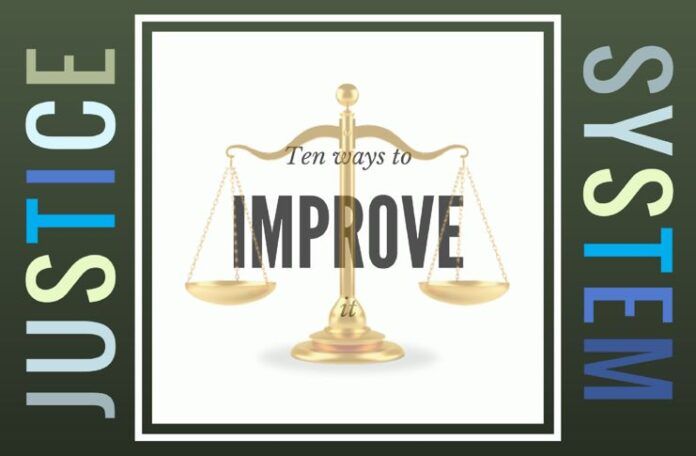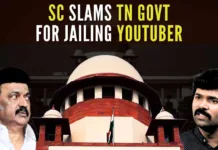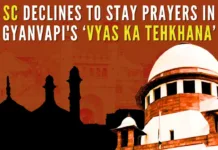
[dropcap color=”#008040″ boxed=”yes” boxed_radius=”8px” class=”” id=””]T[/dropcap]here are innumerable launch pads from which our existing legal framework cripples our justice delivery system and makes it a national tragedy for a population of 125 crores (1.25 billion) at the last count of the Census in 2011. To repeat what was cited in my previous article on the subject, our Law Minister stated in the Lok Sabha last year that the number of pending cases as on 01.12.2015 was 58,906 in the Supreme Court, 41.55 lakhs (4.15 million) in the High Courts, and 2.64 crores (26.4 million) in District and Subordinate Courts. These totaled 3.06 crores (30.6 million).
A criminal case is first tried in a Magistrate’s trial court; then it goes to the Sessions Court; next is a single Bench High Court; next comes the Division Bench of the High Court before going up to the Supreme Court from where it could travel to a Division Bench or a Constitution Bench.
A former Chief Justice of India, H.L. Dattu, in December 2014, described the huge pendency of cases as a matter that “strikes at the very root of democracy and erodes respect for law among citizens who are at the receiving end of unjust treatment. This is where judiciary has to stand as a strong pillar. If this pillar develops cracks, the entire nation will feel its ripples.”
Clearly, a mission on a war footing is needed now, urgently. Clearly, too, there are many targets which must be the focus of our proposed “surgical strikes”.
Only an expert committee like the one suggested in my previous article will be competent to draw up a war plan to reform the legal framework. But, as a layman, the following seem ready for initial attacks.
Let’s start with the amendments that will reduce the “avalanche of case” without weightage to priorities, because all of the below seem essential.
-
A criminal case is first tried in a Magistrate’s trial court; then it goes to the Sessions Court; next is a single Bench High Court; next comes the Division Bench of the High Court before going up to the Supreme Court from where it could travel to a Division Bench or a Constitution Bench. A civil case is first heard in the Small Causes Court and then goes up the ladder in the same way as a criminal case.
The above legal leader entails a lot of work in climbing it, what with forms, attestations, attachments, witnesses, Demand Draft payment, etc. And even in a Court decree for seizing a property is a Himalayan exercise for the beneficiary, what with the corrupt bailiff and the police, apart from the hired goondas engaged by the loser of the case, to stall the hand-over. This path is facilitated by the fact that till the case is heard there is no apparent accountability in the lower level of judges who are not penalized publicly for any of their act of erroneous interpretation of the law or the evidence. If there were such accountability, every judge at the lower level would have to be doubly sure of what verdict he is delivering. Such accountability must therefore be brought about. Let every judge in our courts really earn his pay and perquisites, like in the private corporate sector.
Another contributory factor enabling this ladder to continue surviving is the number of adjournments given in each case. Each adjournment, excepting the ones given on medical grounds, should be paid for by the concerned party at Rs. 25,000 ($375) for the first adjournment, Rs. 50,000 ($750) for the second and Rs. 1,00,000 ($1500) for the third and last. This recourse will not only aid expeditious hearing of cases but also increase the much-needed court revenues for the improvement of court facilities and upkeep.
-
Make frivolous litigation vanish by imposing a fine of Rs. 1,00,000 ($1500) on the litigant and his/her lawyer for frivolous cases. This is because frivolous cases filed in our courts compound the shortage of judges and aggravate the pendency of cases. For instance, cases have been filed for removing the word “Sindh” from our national anthem.
-
Amend the Indian Penal Code, 1860 (IPC) to get rid of its colonial features, and all other laws such as the Debt Recovery Act of 1993 which have failed miserably to achieve their objectives. In fact, In fact, the “Business Standard” newspaper had, on December 17, 2014, published an article titled “Debt Recovery Tribunals Are More Pains Than Gains For Banks”.
-
To remove the corruption among High Court and Supreme Court judges that exists but is never punished, banish the provisions of Article 124 (4) and Article 218 of the Indian Constitution that stipulate an elaborate procedure in Parliament for the removal. of a Supreme Court and a High Court judge from office. In at least two cases in the past, a Judge has got away with resignation from office instead of being jailed under a regular criminal prosecution. That is what should have happened in September 2011 when a High Court judge lost support in the Rajya Sabha but brazened it out till the last minute before resigning. The reform suggested will go a long way in not only preventing corruption but in generally helping the quality and speedy disposal of court cases.
-
Revise the Criminal Procedure Code and Civil Procedure Code so as to make all procedures therein rational and facilitate the litigants and the judicial administration. For instance, there is a totally illogical procedure that the complainant in a criminal case must always be present during a trial hearing, but no such compulsion for the accused! Strangely, in a civil case trial hearing, none of the contesting parties are bound to be present. What is required instead is that all procedures should cause minimum hardship to the litigants as well as the judge and the judicial administration.
-
Have special courts for adjudging criminal and civil cases filed against members of village panchayats, gram panchayats, municipal councils, municipal corporations, State Assemblies/ Union Territories and Members of Parliament. Have two or three regional or central courts for the purpose. Prime Minister Narendra Modi had, in fact, made such a request to the Supreme Court in 2015, but it’s essential to have such special courts for elected representatives to quickly punish their criminality which remains only an allegation for near eternity. Milord Tirath Singh Thakur having done nothing about it, Chidambaram, Lalu Yadav and Jayalalithaa continue being unpunished for their criminal accusations for unacceptable periods and thereby encourage scores of several political entities to continue with their nefarious activities in the rightful belief that the courts of India will go endlessly with the charges against them.
-
Increase the number of Supreme Court judges and introduce Supreme Court Benches in major metro cities of Kolkata, Lucknow, Chennai, Mumbai, Bengaluru and Ahmedabad. Presently, the assigned number of judges for the Supreme Court is 31 (including the Chief Justice). Imagine that number for a country of 125 crores who, moreover, have a fetish for litigation. We not only need many more than 31 Supreme Court judges —all to be distributed over the suggested Benches. This will make justice delivery speedier and also reduce the time and cost of litigants traveling to Delhi alone for Supreme Court justice. Presently, Article 130 of the Constitution of India states that quote “The Supreme Court shall sit in Delhi or in such other places, as the Chief Justice of India may, with the approval of the President, from time to time, appoint.” unquote. That constraining Article 130 needs to go, and Supreme Court Benches need to come in. That reform just cannot wait.
-
Like in the USA, there should no age-limit for the retirement of judges in the High Court and the Supreme Court, subject, of course, to certified six-monthly medical certification regarding their physical and mental health. This will help reduce the shortage of judges, thereby decreasing the continuing acrimonious search for new ones. It will also preempt the temptation of about-to-retire judges from passing verdicts favouring the ruling government in their quest for a sinecure job after retirement. This will also enable the chief judges of higher courts to consolidate the judicial administration system by removing the lots of webs which presently exist. These judges will also be able to undertake the financial budgeting of their courts— something that is overdue for long in the age of financial accountability.
-
Put a stop to judicial overreach. Just why, for instance, should a High Court judge decide on the maximum height of a human pyramid to break the earthen pot on Janmashtami? Many examples exist of such overreach where decisions should be best left to local bodies instead of being permitted to eat into judicial time. Litigate for a certain public cannot be given precedence over the national interest of speedier justice. A PIL should not over-ride an NIL.
-
Upgrade the skills of the court staff to the required standards in communication skills and use of computer technology while simultaneously equipping them with digital equipment like the stenotype machine. Sustained programmes for improvement in work culture of the court staff are also essential.
It’s conceded, once again, that it’s only an expert committee that will do the “surgical strikes” to invigorate and speed up our justice delivery system. But the layman’s view cannot be ignored.
- To Editors’ Guild; May we also have our say… please? - July 17, 2019
- Farooq Sahab is either down with dementia or he is a congenital liar? - July 8, 2019
- Shah Bano, Muslims in gutter &Zakaria’s secularism - June 30, 2019











Except for 8. I agree completely.
Also, SC should be a precedent setting
Court and the lower courts must follow the precedent. There is no need for SC to take all cases needlessly. Most cases can be easily disposed off in lower courts.
My comment is only on issue no 1.
I have been repeatedly expressing for last two decades that in view of most ‘capable’ cases ultimately landing in the supreme court after years/decades of shuttling in various levels of courts, all decisions of all level courts must be treated as de facto supreme court’s as far as dealing with civil/criminal cases coming before them.The system of going on appeal must be discarded as all cases having been dealt with by ‘declared’ supreme courts.
Alternately if lower court decisions are repeatedly reversed by the higher courts, all applying/following the same law,such lower court judges should be considered guilty of professional deficiency omission/commission and must be removed from service.
Even after implementing all these reform it will not even make a dent in the speedy delivery of justice. Court rooms in our country is used as a clerical office, we have to use court rooms for judges to only hear the arguments all other procedural duties should be handled by the back office, Back office should make sure both the parties has submitted to the court all the documents, proof, even deposition should be taken outside court room. Once they have all the papers they should set a trail date for argument, once argument ends next step should be the judgement.
Judges should value the time and money the parties are putting in before they adjourn the matter for later date, they should impose a fine if parties come unprepared and tell the court that they need adjournment, you have to wait for 3 months to hear that your case is again adjourned.
They should bring hard time limit for disposing of the case, if people can build bridges, dams, cities in less than 5years, it is pathetic to see our judicial system taking 18years to decide the corruption case.
Performance of the judge should be based on how fast he has delivered the judgement, how many judgement he has given in his tenure not the year of service.
Whole judicial system in our country is a mockery, bar council, lawyers and judges are in nexus that is benefiting them by dragging the case so that they can make money. To decide any civil case like divorce, bribery you don’t need more then 3 hearings.
Hard to imaging this will change anytime in future